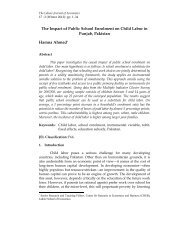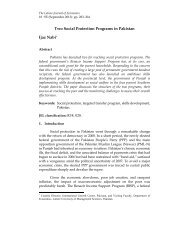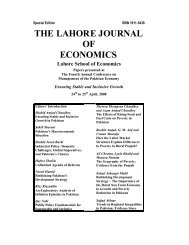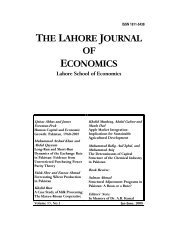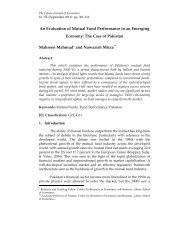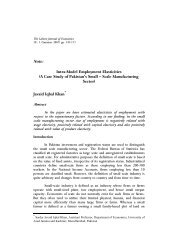Special Edition-07.pdf - Lahore School of Economics
Special Edition-07.pdf - Lahore School of Economics
Special Edition-07.pdf - Lahore School of Economics
You also want an ePaper? Increase the reach of your titles
YUMPU automatically turns print PDFs into web optimized ePapers that Google loves.
50<br />
Shahid Kardar<br />
Depreciation will also reduce the domestic cost <strong>of</strong> production and<br />
have a favorable impact on the trade balance. Hence to deal with a trade<br />
problem, depreciation is always a real policy choice. In any case,<br />
depreciation becomes necessary after a period <strong>of</strong> monetary expansion.<br />
During a longish period <strong>of</strong> monetary expansion, domestic inflation grows<br />
at a faster pace than inflation among our trading partners and<br />
competitors. This inflation differential will eventually have to be bridged<br />
by currency depreciation. Of course, a depreciation in the exchange rate<br />
will have an impact on the rate on inflation to the extent <strong>of</strong> the share <strong>of</strong><br />
traded goods in the economy.<br />
The rupee is currently overvalued. The standard, and hackneyed,<br />
argument <strong>of</strong> policy makers that the price <strong>of</strong> the rupee is no longer determined<br />
by the government but by the market and since capital inflows, most <strong>of</strong> which<br />
are non-debt creating in nature (foreign remittances, privatization receipts,<br />
donor grants and direct foreign investment) are largely financing the deficit on<br />
the external trade account, the value <strong>of</strong> the rupee continues to be steady.<br />
Even if their contention that the market is determining the value <strong>of</strong> the rupee<br />
were to be accepted, the question is whether allowing foreign exchange<br />
inflows (most <strong>of</strong> which are non-secure in nature) to keep the value <strong>of</strong> the<br />
rupee artificially higher (while also requiring monetary management to be<br />
more stringent) than it would be otherwise is a good strategy for the<br />
pr<strong>of</strong>itability <strong>of</strong> our exports, especially considering that our domestic rate <strong>of</strong><br />
inflation is significantly higher than that <strong>of</strong> our trading partners and<br />
competitors. The lowering <strong>of</strong> the pr<strong>of</strong>itability rates and levels in the export<br />
and modern sectors <strong>of</strong> the economy is acting as a disincentive to invest in<br />
these sectors. Hence the movement into other activities like real estate and<br />
the stock exchanges, and to some extent in manufacturing for the domestic<br />
market in the more protected industries.<br />
If China were to follow this advice, the value <strong>of</strong> the Yuan would be<br />
appreciating (since it has a huge trade surplus with the rest <strong>of</strong> the world and<br />
is also experiencing large capital inflows). China, by not choosing to sharply<br />
revalue its currency upwards and maintaining a highly competitive currency,<br />
has not only made it exceedingly difficult for the competitiveness <strong>of</strong> our<br />
exports, but has also kept pr<strong>of</strong>itability and investment high in its exporting<br />
industries. So, who is suffering on account <strong>of</strong> this reality? If, when we find<br />
our strategy unsustainable (especially when there are no privatization<br />
proceeds to finance part <strong>of</strong> the trade deficit), we decide to adjust the value<br />
<strong>of</strong> the rupee, some <strong>of</strong> our export markets would have been lost, having been<br />
captured by others, and our re-entry in these markets is bound to be<br />
awkward, if not impossible.



